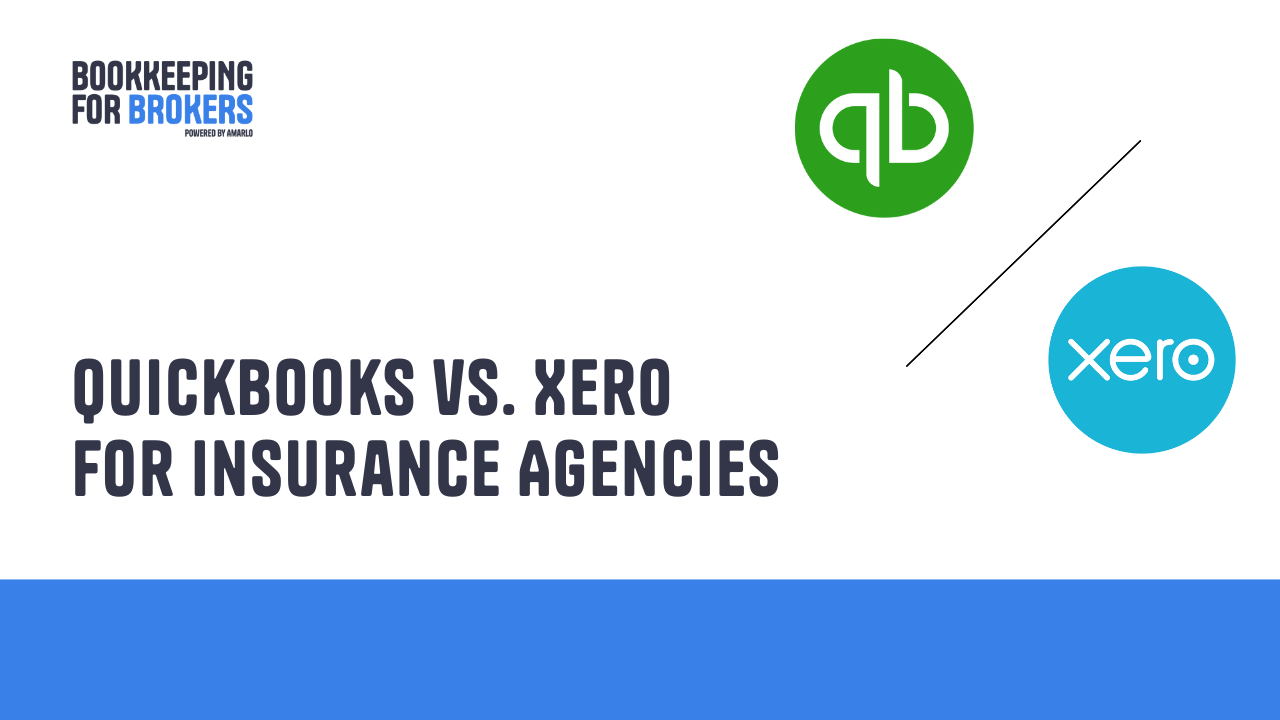QuickBooks vs. Xero for Insurance Agencies: Which Software Is Right for You?

For insurance agencies, accurate bookkeeping is key to staying compliant and maintaining trust. Premium funds, client reimbursements, and commission payouts all need to be tracked precisely to meet regulatory requirements and avoid costly mistakes. The right accounting software makes that process seamless, giving you reliable data you can act on with confidence.
Choosing between QuickBooks Online and Xero is one of the most common questions insurance agency owners face. Both are powerful cloud-based accounting tools, but they serve different kinds of businesses. The best choice depends on how your agency operates and what kind of visibility you want into your numbers.
Let’s look at how each platform stacks up so you can choose the one that helps your agency run smoothly and stay audit-ready all year long.
Understanding Insurance Agency Bookkeeping Needs
Insurance agencies have unique bookkeeping needs that go beyond simple income and expenses. You’re managing money that belongs to multiple parties: clients, carriers, and agents. A single transaction might involve several moving pieces, which makes tracking accuracy crucial.
You also need a system that can handle:
- Premium collections and receivables from carriers
- Agent commissions and overrides that change by policy or producer
- Reimbursable expenses tied to client accounts
- Profitability reports by agent, product line, or location
Without a strong accounting foundation, it becomes hard to tell which lines of business are most profitable. That’s where choosing the right software matters most.
QuickBooks: Reliable and Familiar
QuickBooks is the most widely used accounting software among small and mid-sized U.S. businesses. It’s powerful, well-supported and has an extensive ecosystem of bookkeepers and apps that integrate seamlessly.
For insurance agencies, QuickBooks shines when it comes to reporting and customization. You can set up your chart of accounts to reflect your agency’s income streams, from policy commissions to service fees. You can also use “classes” or “locations” to track results by agent, carrier, or branch, which gives you visibility into which producers or lines are performing best.
Another big advantage is the integration with payroll and commission-tracking tools. Many agencies use third-party apps that sync directly with QuickBooks to automate commission splits, bonuses, and overrides. The reporting capabilities also make it easier to share financials with your CPA or internal CFO team.
If your agency is growing, or if you have multiple agents and complex payout structures, QuickBooks usually fits like a glove. It’s designed for scale and gives you the kind of data you need to make strategic decisions.
Xero: Simple, Flexible and Collaborative
Xero has earned a loyal following among business owners who value simplicity and collaboration. It’s entirely cloud-based, visually clean, and offers unlimited users on most plans, which is something QuickBooks charges extra for.
Xero can be a great fit for smaller insurance agencies as it handles bank feeds, reconciliations, and invoicing effortlessly. Its real-time dashboards make it easy to see cash flow at a glance, and its unlimited-user structure means every agent or team member can have access without driving up your costs.
Xero’s built-in collaboration features make it especially useful if you work closely with an external bookkeeper or fractional CFO. Everyone can log in and see the same data without worrying about version control or syncing desktop files.
However, Xero’s integration ecosystem in the U.S. is not as extensive as QuickBooks’, particularly when it comes to commission-tracking and insurance-specific tools. While you can connect Xero to general CRM or reporting apps, there are fewer ready-made integrations for agency management systems (AMS) or advanced commission calculation platforms. For agencies with simple, flat-rate commissions, Xero works beautifully out of the box. But if your business needs automated splits, overrides, or carrier-linked commission reporting, QuickBooks’ larger U.S. app marketplace and broader support network may offer more flexibility.
For mortgage brokers looking to avoid common financial errors and keep commissions and expenses properly organized, check out Common Bookkeeping Mistakes Mortgage Brokers Make (and How to Fix Them) for practical guidance.
Comparing Features That Matter To Insurance Agencies
When you’re choosing accounting software, the question really is about which one fits the way your agency actually runs.
Here’s how the two stack up in key areas:
.png)
When QuickBooks Might Be The Better Choice
QuickBooks Online is often the right call if your agency is established, multi-agent, or planning to grow. It gives you the detailed financial insights needed for decision-making and integrates easily with commission tools and reporting dashboards.
You’ll likely prefer QuickBooks if:
- You have multiple agents and complex commission structures
- You want advanced reporting and data customization
- You need to integrate with payroll or CRM tools used widely in the U.S.
- You plan to outsource bookkeeping or CFO services to a team familiar with QBO
Once set up correctly, QuickBooks becomes the backbone of your financial management. It helps ensure every transaction, from carrier payments to agent commissions, is tracked and categorized properly.
In our experience, QuickBooks is often the right choice for most insurance agencies, and we recommend it to almost everyone.
When Xero Might Be The Better Choice
Xero is a strong option if your agency is smaller, more cost-sensitive, or values simplicity over advanced customization. Its unlimited-user access makes collaboration effortless, and its clean interface is excellent for business owners who prefer a quick visual snapshot of their finances.
You might choose Xero if:
- You have a smaller team with simpler payout structures
- You want unlimited users without extra cost
- You value real-time collaboration with your bookkeeper or CFO
- You prefer an easy-to-use system and don’t need heavy reporting
Xero provides everything you need for many smaller agencies without the extra layers of complexity.
Final Thoughts
The right accounting software for your insurance agency depends on your size, structure, and growth goals. Whichever you choose, the software is just the starting point. What matters most is how it’s set up and maintained. A proper chart of accounts, consistent reconciliation, and accurate reporting give you the clarity to make confident financial decisions.
At Bookkeeping for Brokers, we help insurance agencies design accounting systems that work for them, from setting up QuickBooks the right way to providing ongoing bookkeeping and CFO support.
If you’re ready to organize your books and see exactly how your agency is performing, contact our team today.
.svg)
time to get help with your bookkeeping?
Our professional bookkeepers ensure your financial records meet all IRS standards, freeing you from administrative work. Delegate your bookkeeping and concentrate on core business growth.
.svg)
time to get help with your bookkeeping?
Our professional bookkeepers ensure your financial records meet all IRS standards, freeing you from administrative work. Delegate your bookkeeping and concentrate on core business growth.




